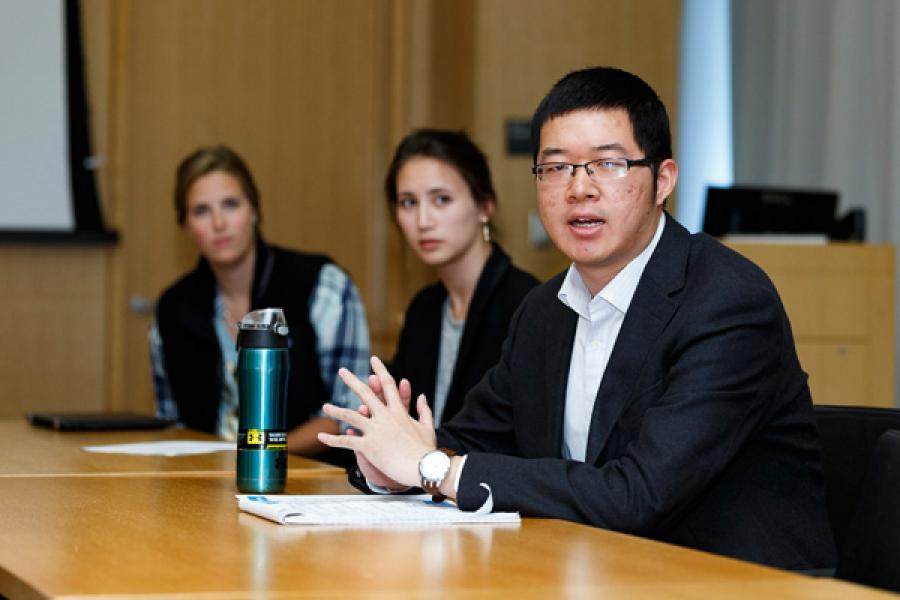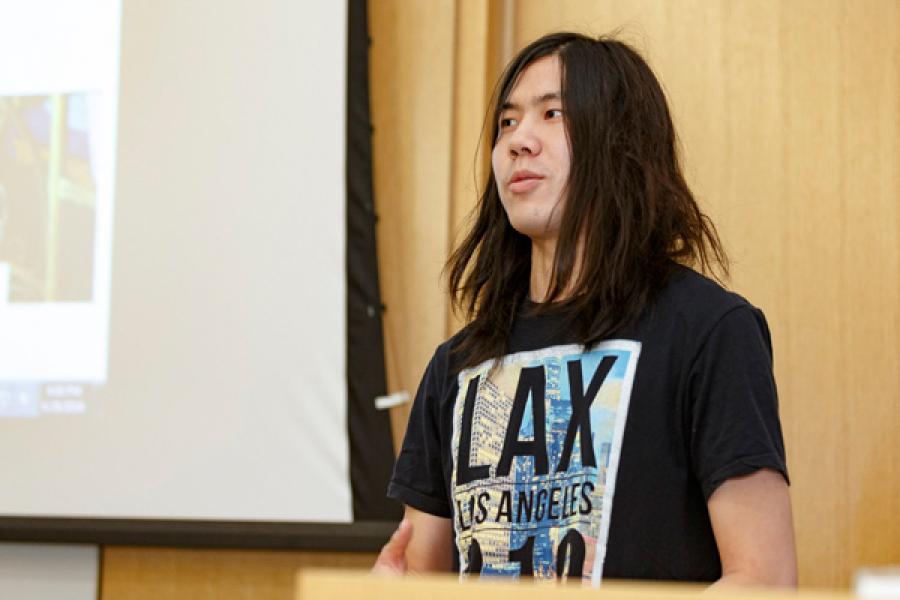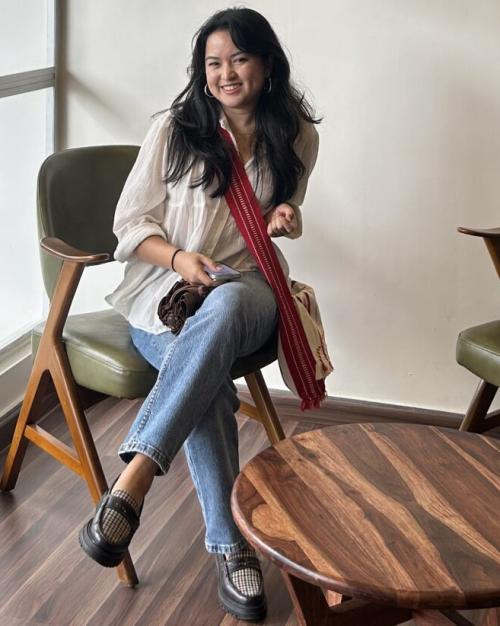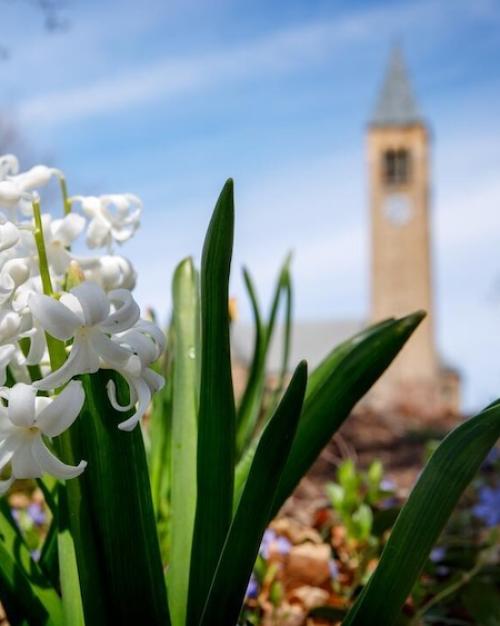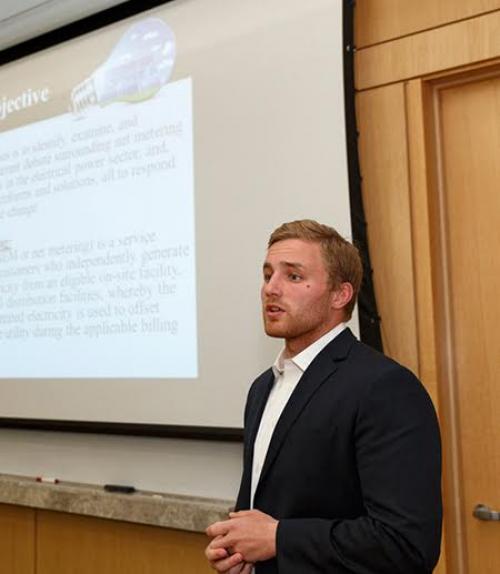For students who have many interests across diverse disciplines, the College Scholar Program in the College of Arts & Sciencs may fit their needs. This year’s graduating class of College Scholars recently presented their final research projects, focused on topics such the anthropology of food and China’s naval development.
“The College Scholar Program is designed to allow a few A&S students who have completed a very successful first year at Cornell to immerse themselves in courses and research with faculty without the restrictions of the usual requirements for graduation during their remaining three years in the College,” said Anne Birien, advising dean and director of the College Scholar Program.
The program requires students to complete a final senior project over the course of a semester or two. Said Birien, “College Scholars start thinking about their senior projects early; they regularly take stock of the evolution of their interests and very deliberately prioritize courses (or research opportunities) that will prepare them to embark on ambitious interdisciplinary research projects senior year.”The program “gives students a taste of graduate study,” Birien said. “Designing a personalized course of study that is both original and rigorous requires a great deal of personal drive and independence. Recently, the Lynne Abel Fund has made it possible to multiply opportunities for College Scholars to travel to conferences, attend workshops, or focus on summer research and writing.
The 2016 cohort of College Scholars consisted of 12 students who completed final senior projects on topics as diverse as “America’s Evolving Energy Landscape in the Face of Climate Change” to “The Catchiness Phenomenon: Understanding the relationship between earworms, musical memory and gene-specific preferences for music.”
Zihao Liu’s project, “Chinese Nationalism and China’s Naval Development,” examined the historical evolution of Chinese nationalism regarding China’s sea power.
Liu said he had been interested in naval vessels since childhood and had done his best to follow military affairs, so he suspected he would probably write a thesis related to international relations and security development, but he didn’t identify his exact focus until the spring of his junior year.
“I read Prof. Robert Ross’ (of Boston University) description of Chinese naval nationalism in sophomore year and was impressed by it,” Liu said. “Last year though, I thought his theory could be discussed in more detail and expanded.”
Liu spent a lot of time looking at archival documents, articles and analyses of the Chinese navy online, as well as official directives and publications, to get information for his thesis.
Liu said that the College Scholar program “offered me great freedom in choosing my topic and in selecting my research methods. In addition, the College Scholar community is small, but close. I was able to get to know other students with really interesting research topics.”
Scholar Rachel Mochon’s interest in art conservation led her to take classes in a variety of disciplines, including chemistry, art history, French and studio art.“During my senior year, I explored the conservation of artworks containing Prussian blue pigment, specifically cyanotypes, under the guidance of Professor Annetta Alexandridis and Professor Roald Hoffmann,” Mochon said.
Each summer, Mochon supplemented her schoolwork with internships at art museums in Texas and Washington D.C. In the summer after her junior year, she worked in the conservation lab at the National Museum of the American Indian, part of the Smithsonian Institution in Washington D.C. where she prepared a variety of ethnographic objects for exhibition.
Aaron Benedict was able to pursue his interest in the environment. “During my freshman year I loved my classes … yet I struggled to decide upon a major because I was quite fascinated by interdisciplinary subject matter,” Benedict said. “My faculty advisor told me about the College Scholar program.”
During his senior year, Benedict wrote a thesis entitled “America’s Changing Energy Landscape: Net energy metering, disruptive technological innovation, and evolving electric utility business models,” He completed preparatory coursework in the fields of government, policy, business, economics and the natural sciences.
“I could not have otherwise so perfectly matched my intellectual passions with a single or even a double major in another field,” Benedict said.
Many of this year’s College Scholars received awards, including the Harrop and Ruth Freeman Prize in Peace Studies, the George Harmon Coxe Award in American Literature, the inaugural Community Engagement Trailblazer Award and First Prize in the Honors Thesis Contest for the Center for Inequality Studies. Liu and Benedict shared this year’s Tomasic prize, the prize recognizing the best thesis proposal(s) written by honors candidates in the College Scholar Program. Mahar and Klein were both Hunter Rawlings Presidential Research Scholars.
